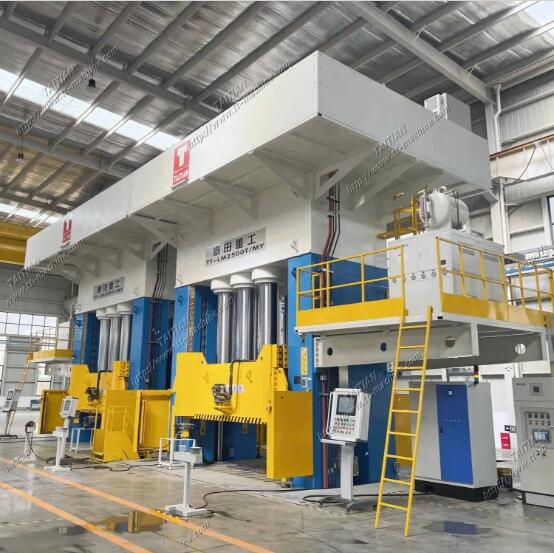The 2500T RTM Hydraulic Press: Key to High-Performance Composite Manufacturing
2024-09-07
Composite materials, known for their strength, light weight, and versatility, are becoming integral to industries like automotive, aerospace, construction, and energy. The 2500T RTM (Resin Transfer Molding) Hydraulic Press, designed for heavy-duty applications and adhering to CE standards, has emerged as a cornerstone of composite production. In this blog, we’ll explore how this innovative hydraulic press is enabling manufacturers to create high-performance composite parts, meeting both industrial demand and sustainability goals.
1. The Role of RTM in Modern Manufacturing
The Resin Transfer Molding (RTM) process, which is the focus of the 2500T press, involves injecting liquid resin into a closed mold containing pre-placed fibers (usually glass or carbon). The resin cures within the mold to form a solid, lightweight part. RTM is popular for producing complex, high-performance components with precision and consistency.
Key benefits of RTM include:
- Design Versatility: Ideal for manufacturing parts with complex shapes and integrated structures.
- Improved Surface Finish: RTM produces a smooth surface finish, often eliminating the need for additional processing.
- Strength and Durability: The parts produced exhibit excellent mechanical properties, including high strength-to-weight ratios.
2. How the 2500T RTM Hydraulic Press Enhances the Process
The 2500T RTM Forming Hydraulic Press is purpose-built to handle the stringent demands of composite manufacturing. Let’s explore the features that make it a must-have tool for manufacturers aiming for high-quality output:
- Large Tonnage Capacity: With a pressing force of 2500 tons, this machine is capable of handling large, intricate molds. This makes it perfect for producing structural automotive components, aerospace parts, and large wind turbine blades.
- Precision Engineering: Equipped with advanced control systems, including programmable logic controllers (PLC) and automated temperature control, the press ensures precise regulation of pressure, temperature, and cycle times. This level of precision is critical to achieving uniform fiber distribution and ensuring that resin fully penetrates the mold.
- Cycle Time Reduction: The press’s design allows for rapid curing, leading to shorter cycle times. This is crucial for manufacturers who need to maintain high throughput without compromising on quality, especially in industries with tight production deadlines.
3. Sustainability and Efficiency in Composite Production
One of the standout benefits of the 2500T RTM hydraulic press is its ability to support sustainability efforts in the manufacturing process. As the global focus shifts toward greener production practices, this press provides several advantages:
- Reduced Material Waste: The RTM process, combined with the precision of the 2500T press, ensures that the exact amount of resin and fiber is used, reducing excess and minimizing material waste.
- Energy-Efficient Operation: The hydraulic press is equipped with servo-controlled hydraulic systems that optimize energy consumption during production. By using less energy per cycle, manufacturers can cut costs and reduce their environmental impact.
- Recyclable Composites: As more research is conducted on sustainable composite materials, manufacturers using the 2500T press can produce recyclable components, contributing to a circular economy. The press’s ability to handle advanced composite materials aligns with these future-forward sustainability goals.
4. Meeting Industry Standards and Safety
In addition to its technical capabilities, the 2500T RTM hydraulic press complies with CE safety standards, ensuring it meets the rigorous demands of modern manufacturing environments. Here’s why this matters:
- CE Certification: This certification means the press adheres to strict European safety standards, ensuring that it is safe to operate in both small and large-scale manufacturing environments.
- Operator Safety Features: Built-in safety measures like emergency stop functions, safety guards, and overload protection ensure that operators can work confidently, knowing they are protected from potential hazards.
- Compliance with Industry Regulations: For industries like aerospace and automotive, compliance with safety standards is essential. The 2500T press’s adherence to CE standards ensures it meets the stringent quality and safety requirements that these sectors demand.
5. Applications Across Multiple Industries
The versatility of the 2500T RTM hydraulic press makes it an invaluable asset in a variety of industries. Let’s explore a few key applications:
- Automotive: Lightweight composites are increasingly being used to replace metal components in vehicles. The 2500T press is perfect for creating car body panels, chassis components, and even interior parts, all of which contribute to improved fuel efficiency and performance.
- Aerospace: Aircraft manufacturers rely on the strength and weight benefits of composites. The 2500T press produces large, durable parts that can withstand the stresses of high-altitude flight while contributing to overall weight reduction, which is critical for fuel savings.
- Wind Energy: In the renewable energy sector, the 2500T press is used to create large-scale components like wind turbine blades. These parts must be lightweight yet able to endure harsh weather conditions and high mechanical stress, making the RTM process ideal for this application.
- Construction: The press is also used to manufacture composite parts for the construction industry, such as architectural facades, roofing panels, and reinforcement structures, where durability and design flexibility are essential.
6. Future Trends: Customization and Smart Manufacturing
The future of composite manufacturing lies in customization, and the 2500T RTM hydraulic press is equipped to meet these evolving needs. As Industry 4.0 technologies continue to be integrated into manufacturing processes, the press’s advanced control systems can be adapted for smart manufacturing and digital monitoring.
- Custom Mold Designs: Manufacturers are increasingly looking for ways to produce customized parts quickly and efficiently. The 2500T press’s ability to handle complex, custom mold designs allows companies to meet specific client needs, particularly in industries like automotive and construction.
- Integration with IoT: The press can be integrated with IoT (Internet of Things) technologies to allow for remote monitoring, predictive maintenance, and automated adjustments. This helps manufacturers maintain optimal production conditions and minimize downtime.
Conclusion
The 2500T RTM Forming Hydraulic Press is a powerful tool that is shaping the future of composite manufacturing. By providing high tonnage capacity, precision control, and the ability to meet modern sustainability and safety standards, this hydraulic press is a valuable asset in industries ranging from automotive and aerospace to renewable energy and construction. As manufacturers continue to seek lightweight, durable, and eco-friendly materials, the 2500T RTM press will remain at the forefront of innovation in composite production.
Whether your focus is on increased efficiency, precision manufacturing, or sustainable production, the 2500T RTM hydraulic press offers a solution that meets the needs of today’s rapidly evolving manufacturing landscape.



